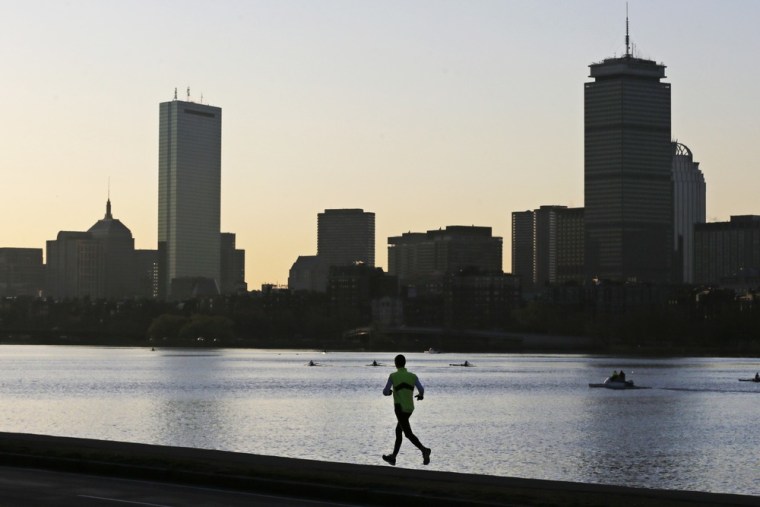
At La Voile restaurant on Boston’s upscale Newbury Street, where the filet de boeuf goes for $47, dinner traffic has fallen off sharply since a pair of deadly bomb blasts two blocks away left the city badly shaken.
“They are canceling one after the other,” said manager Delphine Chaufsier. “People are just not celebrating for the moment or dining out at night. I think they’re going to stay home for a while, maybe a few days. It’s hard to say.”
As police continue to cordon off a 12-block crime scene at the heart of the city’s retail and hotel district, Monday's terror attack on Boston’s iconic marathon has left more questions than answers. At least three are dead and 176 injured. Many are still under treatment in area hospitals. Police have yet to identify a suspect or motive.
Read more on bombing: Bombs were in backpacks, officials believe
On Tuesday, Massachusetts Gov. Deval Patrick said the state would be open for business, "but it will not be business as usual."
Commuters riding MBTA subways and buses found beefed-up police presence, including random searches of packages, bags, and backpacks, on the day after the worst bombing on U.S. soil since the terror attacks of Sept.11, 2001.
Those 2001 attacks had a measurable impact on the U.S. economy, after consumer and business confidence was badly shaken. The longer term business and economic impact of the Boston bombing is difficult to assess.
Until more is known, though, Bostonians – and the more than 28 million domestic and international visitors who come to New England’s historic Hub every year – may think twice about turning out for large public gatherings like the 117th running of the marathon that was targeted in the attack.
The annual marathon alone generates nearly $140 million in revenues for local hotels, shops, restaurants, and other businesses, according to the Boston Athletic Association, which sponsors the race.
“This won’t be just affecting the marathon, it's likely to affect events that will happen outdoors this summer," said Alan Clayton-Matthews, a Northeastern University professor who focuses on the region’s economy. “People are going to remember that video of the bomb exploding on the sidewalk and be wary of crowds and going out and about.”
The greater metro area’s $325 billion economy could also suffer if security concerns give pause to out-of-town convention planners. Boston area hotels sold 6.3 million room nights last year, generating $1.4 billion in revenues. Even before the marathon attack, convention bookings were expected to soften this year, according to the Greater Boston Convention and Visitors Bureau.
The wider impact on consumer psychology, though, is difficult to predict.
That's especially true when so little is known about the motives and details of the bombing, according to Boston University economist Laurence Kotlikoff, who lives just blocks away from the site of the blast.
“I think it’s going to depend very much on whether they find these guys quickly,” he said. “If they don’t it will put a bigger damper (on confidence.) It still feels at this point like it’s an isolated incident.”
No matter what the outcome, the financial cost of the first response and ongoing investigation will be substantial. So too, will be the increased cost of trying to thwart future attacks, according to Clayton-Matthews.
“They’ll need more security before events with crowds and have to have more police and emergency personnel ready whenever there’s an event with a crowd in the city,” he said.
Whatever the long-term impact, Boston’s vibrant economy is well positioned for possible economic aftershocks from the attack. Its young and well-educated workforce continues to grow, helping to pull the regional economy out of the Great Recession earlier and faster than the rest of the country. At 6.0 percent, the city’s unemployment rate is below the national average.
Though tourism generates more than $8 billion a year in revenues, Boston’s economy is well diversified among a broad base.
A transportation and trade hub, the city is also home to a large financial services industry and more than 50 colleges and universities. With more than 30 area hospitals, the growing health care industry is Boston’s largest employer. Even the moribund construction industry, which is still struggling in much of the rest of the country, last year bounced back in Boston to pre-recession levels of more than $3.8 billion.
“I don’t really think this is going to have any major long-term consequences for our economy – or at least that’s my hope,” said Kotlikoff.
The city’s finances are also in better shape than many municipalities still recovering from budget gaps opened up by lower property taxes and cuts in state and federal aid. Departing Mayor Thomas Menino, in his 20th and final budget, has proposed increased spending on new parks, libraries, government buildings and schools. The $2.6 billion spending plan is nearly $140 million higher than last year, with $60 million in new funding to hire more teachers.
Some Bostonians say the city is already looking to the future.
“It’s going to be a big summer; it’s a prime time for tourist season,” said Stephanie Telesco, manager at Sweet, a cupcake shop a few blocks from the blast site.
“In the city we’re all feeling pretty strong coming out of yesterday and really looking to move forward from here."
(Reuters contributed to this report.)